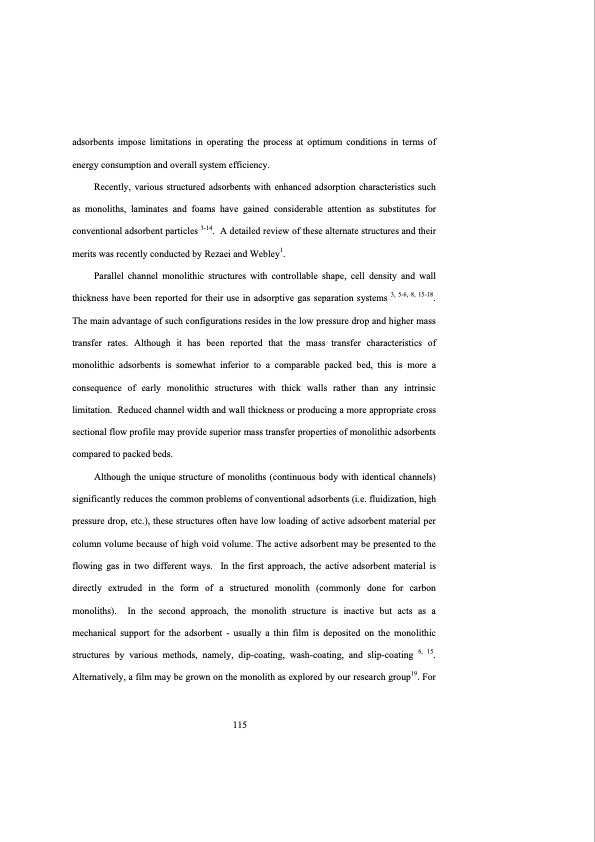
PDF Publication Title:
Text from PDF Page: 131
adsorbents impose limitations in operating the process at optimum conditions in terms of energy consumption and overall system efficiency. Recently, various structured adsorbents with enhanced adsorption characteristics such as monoliths, laminates and foams have gained considerable attention as substitutes for conventional adsorbent particles 3-14. A detailed review of these alternate structures and their merits was recently conducted by Rezaei and Webley1. Parallel channel monolithic structures with controllable shape, cell density and wall thickness have been reported for their use in adsorptive gas separation systems 3, 5-6, 8, 15-18. The main advantage of such configurations resides in the low pressure drop and higher mass transfer rates. Although it has been reported that the mass transfer characteristics of monolithic adsorbents is somewhat inferior to a comparable packed bed, this is more a consequence of early monolithic structures with thick walls rather than any intrinsic limitation. Reduced channel width and wall thickness or producing a more appropriate cross sectional flow profile may provide superior mass transfer properties of monolithic adsorbents compared to packed beds. Although the unique structure of monoliths (continuous body with identical channels) significantly reduces the common problems of conventional adsorbents (i.e. fluidization, high pressure drop, etc.), these structures often have low loading of active adsorbent material per column volume because of high void volume. The active adsorbent may be presented to the flowing gas in two different ways. In the first approach, the active adsorbent material is directly extruded in the form of a structured monolith (commonly done for carbon monoliths). In the second approach, the monolith structure is inactive but acts as a mechanical support for the adsorbent - usually a thin film is deposited on the monolithic structures by various methods, namely, dip-coating, wash-coating, and slip-coating 6, 15. Alternatively, a film may be grown on the monolith as explored by our research group19. For 115PDF Image | Structured Zeolite Adsorbents for PSA Applications

PDF Search Title:
Structured Zeolite Adsorbents for PSA ApplicationsOriginal File Name Searched:
structured-zeolites.pdfDIY PDF Search: Google It | Yahoo | Bing
CO2 Organic Rankine Cycle Experimenter Platform The supercritical CO2 phase change system is both a heat pump and organic rankine cycle which can be used for those purposes and as a supercritical extractor for advanced subcritical and supercritical extraction technology. Uses include producing nanoparticles, precious metal CO2 extraction, lithium battery recycling, and other applications... More Info
Heat Pumps CO2 ORC Heat Pump System Platform More Info
| CONTACT TEL: 608-238-6001 Email: greg@infinityturbine.com | RSS | AMP |